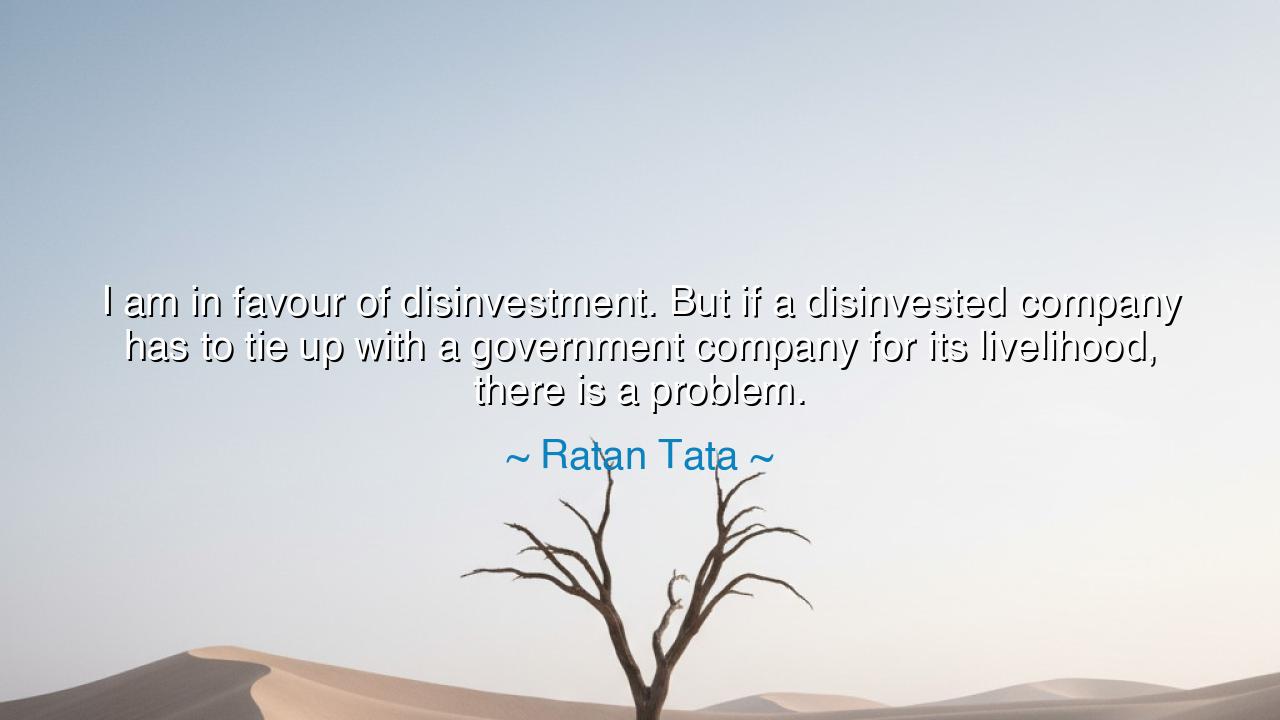
I am in favour of disinvestment. But if a disinvested company has
I am in favour of disinvestment. But if a disinvested company has to tie up with a government company for its livelihood, there is a problem.






In the quiet halls of commerce and the stormy seas of enterprise, the venerable Ratan Tata, a man of both humility and might, spoke words that resonate with the weight of truth and the calm of experience:
"I am in favour of disinvestment. But if a disinvested company has to tie up with a government company for its livelihood, there is a problem."
At first, these words seem to concern only the affairs of business, but within them lies a teaching for all ages — about freedom, dependence, and the delicate art of true autonomy. Tata, who has built empires not merely of wealth but of integrity, speaks here not of money alone, but of the soul of enterprise — the spirit that must remain unshackled if it is to thrive.
In the ancient days of kingdoms and merchants, those who sought prosperity learned a sacred truth: liberation without self-reliance is an illusion. To be freed from one master only to serve another is not freedom but a change of chains. When Tata speaks of disinvestment, he praises the act of release — the government loosening its grip on industry, allowing the spirit of private enterprise to breathe. But he warns, with the wisdom of one who has seen much, that if the freed company must yet rely upon the same government for its survival, then it has not been born anew; it merely walks in circles, bound by invisible threads.
Consider the story of India’s steel industry — the pride of a nation’s labor. Once, in the early years after independence, the state took upon itself the mantle of builder and protector, forging great factories to nourish a fledgling economy. It was an age of purpose, of reconstruction. Yet as time passed, bureaucracy grew heavy, and innovation began to wither under layers of control. When the winds of liberalization blew in the 1990s, disinvestment became the cry of the new dawn. But as Tata warns, if those same industries, once freed, found themselves dependent still on state contracts, state capital, or state mercy, then their rebirth was only half complete. True freedom demands self-sustaining strength, not borrowed breath.
Tata’s words are not condemnation, but counsel. He sees the state as the gardener — meant to nurture the seed, not to wrap its roots so tightly that it cannot grow. Government should provide the soil of opportunity and the sunlight of stability, but the enterprise must grow by its own will, its own energy, and its own daring. When a company cannot stand without leaning upon the state, its growth is stunted, and its destiny bound by politics rather than purpose. The master of industry reminds us that dependence breeds weakness, and weakness, once grown, becomes a habit that devours vision.
This lesson is as old as civilization itself. In the golden age of Athens, the great philosopher Plato warned that a city cannot flourish if its craftsmen depend upon the state for their survival, for creativity perishes where security is absolute. And in the era of the Industrial Revolution, the innovators who reshaped the world — men like Andrew Carnegie, Jamshedji Tata, and Henry Ford — built empires not upon government favor, but upon courage, foresight, and relentless effort. Each stood apart from power, even while working alongside it, knowing that greatness demands both partnership and independence.
There is also a deeper current beneath Tata’s words — a call to integrity in progress. To advocate for disinvestment is to believe in efficiency, but to demand independence after disinvestment is to believe in character. For what use is privatization if it breeds new dependence? What meaning has liberty if it is bartered for comfort? The elder industrialist, in his quiet way, urges every generation of builders to craft institutions that stand upon principles, not permissions; upon excellence, not entitlement.
And so, O seeker of wisdom and work, hear this teaching well: freedom without foundation is folly. To truly prosper, build not on borrowed strength, but on your own conviction and competence. Whether you are a merchant, an artist, or a maker of machines, let your work be so steadfast that no power can make or break you. Respect the government, but never let it be your crutch; honor collaboration, but guard your independence like a sacred flame.
For in the end, Ratan Tata’s words remind us that the destiny of a company — and indeed of every soul — is not to be maintained, but to stand tall and self-reliant. Let every man, every enterprise, every nation heed this truth: freedom given is fragile, but freedom earned endures forever.
Thus ends the teaching: independence is not bestowed — it is built.






AAdministratorAdministrator
Welcome, honored guests. Please leave a comment, we will respond soon